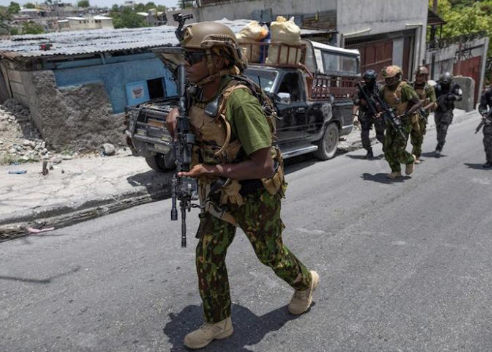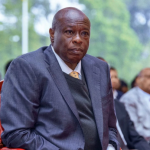Pressure is increasing on Kenyan police officers to fulfill their promise of helping to control Haiti’s rampant gangs, six weeks after their arrival in the Caribbean nation.
When the first contingent of 200 elite Kenyan police officers landed in Port-au-Prince on June 25, they stepped off their Kenyan Airways flight confidently, clad in helmets and combat gear, carrying their weapons, and proudly holding the Kenyan national flag. They chanted in Swahili to energize themselves on the airport tarmac, as did a second group of 200 officers who arrived three weeks later.
“Let’s go!” and “We’re moving!” echoed their calls. There were high hopes that the Kenyan police would provide much-needed support to Haiti’s beleaguered National Police (PNH), which has struggled to contain a deadly wave of violence from criminal gangs that have terrorized the capital and vast areas of the country for over three years.
The Kenyans form the core advance guard of a UN-mandated multinational force aimed at restoring peace in Haiti.
Initially, they were warmly welcomed by Haitian government leaders and celebrated by many in the local media. Radio Independante FM even posted a welcoming message in Creole, stating, “Haiti is the country of all Africans. Since you are black, Haiti is your home… You Kenyan soldiers are at home and must be welcomed to help fight these wasters [the gangs] that prevent us from living in our country.”
However, as weeks have passed since their much-anticipated deployment—which had already faced delays due to legal challenges in Kenya and logistical issues—many Haitians are expressing frustration and disappointment over the slow and indecisive actions of the Kenyan force and their Haitian police counterparts against the gangs, their leaders, and known hideouts. Discontent is growing in Haitian media and social media circles, with increasing calls for “actions not words” and “concrete results.”
Some of the sharpest criticism accuses the Kenyans of engaging in “theatrics” and being mere “tourists.” Critics argue that despite high-profile joint patrols by Kenyan and Haitian police in Port-au-Prince, where they have exchanged fire with suspected gang members, the gangs appear to have tightened their control over the southwestern and northeastern suburbs of the capital since the Kenyan mission began.
Gang members have attacked and either burned or partially destroyed police stations while continuing to target major highways out of the capital and inland. There is a growing sentiment among some that the Kenyan force has been too slow to assert its presence.
Local news outlet AyiboPost questioned, “What are the Kenyans waiting for to act against the bandits?” in an article posted on X on July 11, two weeks after the East Africans arrived.
About two weeks later, the online news site Le Filet Info pointedly remarked, “The presence of the Kenyan police in the country does not seem to intimidate the bandits. They continue to massacre members of the civilian population.” The Kenyan contingent has already faced its first casualty since arriving in Haiti. On July 30, a Kenyan policeman sustained a gunshot wound to the shoulder in Port-au-Prince during a patrol that engaged gang members.
That same day, Haitian police chief Rameau Normil, along with Kenyan force commander Godfrey Otunge, attempted to counter unfavorable local media coverage by announcing that over 100 “bandits” had been killed by Haitian and Kenyan police during operations carried out under a state of emergency declared in the most gang-affected areas since mid-July. However, such statements have failed to quell public skepticism.
Confidence was further eroded by the circulation of videos showing top Haitian government officials, escorted by Kenyan and Haitian police, making a hurried retreat on July 29 from the abandoned General Hospital in downtown Port-au-Prince amidst a barrage of gunfire, despite both police forces claiming control of the facility.
In the face of this criticism, Haiti’s interim Prime Minister Garry Conille told BBC HARDtalk that he welcomed the support, acknowledging the Haitian police’s understaffed situation. “We do need the help… yet it’s coming in too slowly, and Haitians are growing impatient,” he conceded. The prime minister also dismissed concerns regarding the deployment of Kenyan officers, despite their heavy-handed response to recent anti-government protests in Kenya.
“The respect for our laws and operational procedures have been very very good and we’re very happy with the accompaniment we’re receiving,” he said, emphasising that the role of the Kenyans was to support and accompany the police – not operate independently.
Nonetheless the Kenyans have faced open defiance from prominent Haitian gang leaders.
Only days after the arrival of the first group of Kenyans, Jimmy “Barbecue” Chérizier, an outspoken leader of the “Viv Ansanm” (Live Together) gangs coalition, appeared in a provocative video lasting almost eight minutes that was posted on X.
Leading his masked foot soldiers in a strutting, chanting war dance through his Delmas 6 stronghold, they held their automatic weapons aloft.
“Here’s Kenya [the Kenyans], bullets [for them],” they chanted in Creole at one point.
Other gang leaders, including Wilson “Lanmo Sanjou” Joseph, the boss of the “400 Mawozo” gang, and youthful gang chief “Ti Bebe Bougoy”, have also been appearing in videos taunting both Haitian authorities and the Kenyans, while the gangs continue to boast of their attacks.
In mid-July, the Kenyan contingent of the multi-national force launched their own X account, @MSSMHaiti, in a bid to set the tone of the public narrative of their mission in Haiti.
Its daily reports on the Kenyans’ activities range from receiving visiting dignitaries at their base, to human rights lessons, and upbeat accounts of “reassurance” patrols on the streets of Port-au-Prince.
But the determined optimism of the @MSSMHaiti stream, particularly references to “significant success” and “gradual return to normalcy”, appears to have rankled many in Haiti.
Some Haitians have denounced the Kenyan reports as, at best, overblown – and, at worst, “propaganda”.



